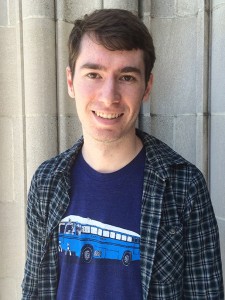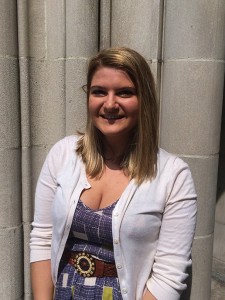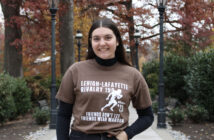
Alexandria Kennedy, ’15, stands outside of Linderman Library on Thursday, April 30, 2015. She was a member of the highly selective Eckardt Scholars Program. (Danielle Campbell/B&W Photo)
Senior students who participated in the Eckardt Scholars Program premiered their independently created studies Sunday in presentations.
The Eckardt Scholars Program allows students with specific and deep interests in a topic to work with a professor as a mentor, as well as program director Dr. Heather Johnson, to create and investigate an individualized course of study. This honors program within the College of Arts and Sciences is selective and rigorous, but it provides flexibility and immense opportunity for its students to be successful in their desired fields of study.
“The program is one of the main reasons I came to Lehigh,” said Ryan Andrews, ’15, one of the senior students involved with the program.
Like all college students, Eckardt Scholars are able to select the major of their choice, but what sets them from the rest is that they have the opportunity to delve deeply into their passions through research, while choosing their courses with minimal restriction.
For Alexandria Kennedy, ’15, the program allowed her to major in four different subjects, including international relations, art history, German and global studies. Kennedy researched around 20 pieces of art for her project and linked them together through the overarching theme of contested ownership.
She researched the movement of art pieces and how they fell under the ownership of certain countries. While Kennedy worked as an Eckardt Scholar, tying together all four of her majors, her project was ultimately for her art history senior thesis.

Ryan Andrews, ’15, stands outside of Linderman Library on Thursday, April 30, 2015. He was as a member of the highly selective Eckardt Scholars Program. (Danielle Campbell/B&W Photo)
“Everyone is going to have their own personal experiences in what they want to pursue,” said Kennedy, in regards to her interdisciplinary project.
Andrews has been working on his project since July 2014.
As an Eckardt Scholar, Andrews had the freedom to take a lot of classes that he wanted, such as chemistry, organic chemistry and biology, and many psychology courses, without having to worry about the typical core requirements.
Pertaining particularly to his interest in neuroscience, Andrews sought out research opportunities during the summer of 2013. He initially worked with graduate students, getting used to different research techniques, he said. After that, he branched off and started working with his academic advisor, professor of behavioral neuroendocrinology Jill Schneider, in the lab.
When it came time to choose his project, Andrews recalled deciding between two or three different experiments, and he chose one experiment where he was able apply his knowledge and look at brains. He wanted to delve further into techniques he was already familiar with from his previous research experiences.

Erin Pamukcu, ’15, stands outside of Linderman Library on Thursday, April 30, 2015. She was as a member of the highly selective Eckardt Scholars Program. (Danielle Campbell/B&W Photo)
“I started looking at different types of ingestive behaviors that hamsters show and what parts of the brain control their behaviors,” Andrews said.
Because he is not yet finished with his project, Andrews plans on remaining on Lehigh’s campus for about a month after graduation to complete his research. Following this, he said he hopes to find a research position at a grad school or hospital to further study his passion of neuroscience.
Inspiration for Eckardt Scholars comes from many different places, and for Erin Pamukcu, ‘15, the inspiration came from her study abroad program in Nepal, where she observed how the decade-long conflict, the Nepalese Civil War, still impacted its residents. As an English and political science double major, Pamukcu studied pre- and post-conflict Nepal in literature and the metamorphosis of Nepal’s people.
“I used one skill that I had to represent another,” said Pamukcu about her project.





Comment policy
Comments posted to The Brown and White website are reviewed by a moderator before being approved. Incendiary speech or harassing language, including comments targeted at individuals, may be deemed unacceptable and not published. Spam and other soliciting will also be declined.
The Brown and White also reserves the right to not publish entirely anonymous comments.